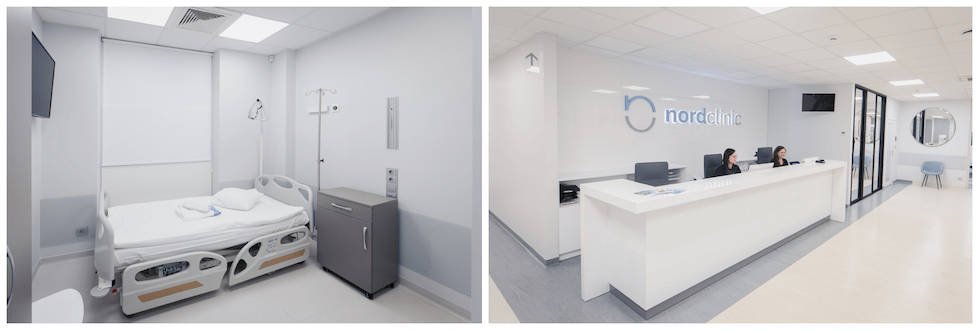Banded Gastric Bypass Abroad: Lithuania
We are one of the leading bariatric surgery clinics for medical tourists in the European Union. We are proud of the fact that over 90 % of our patients come from the UK, Ireland, Norway, Sweden, Denmark, Germany, Switzerland and other countries.
See before-after pictures
Reviews and Facebook group
Our patients and clinic in the media
Prices
- Banded gastric bypass – 6.100 £
Gastric bypass variations in our clinic:
- Roux-en-Y gastric bypass – 5.450 £
- Mini gastric bypass – 5.450 £
- Hiatal hernia repaired during weight loss surgery for FREE.
- Plastic surgery after a massive weight loss – from 580 £
Regular consultations with Prof. Almantas Maleckas in London
- accommodation with medical care – from 58 £ per night
- plastic surgeon consultation 12 months after surgery (if interested) – FREE
Regular price:
- consultation with the surgeon and anaesthesiologist
- all the necessary health tests before and after the surgery
- bariatric surgery
- anaesthesia
- hospital stay (1-3 days) with 24 hours medical care
- 24/7 personal assistance during your stay
- transfers to / from the airport, hotel and clinic
- diet instructions after bariatric surgery
- FREE dietician follow-up for 5 years
Please note that the price of the surgery itself is provisional and may be accurately assessed only after the evaluation of each individual case.
The default currency at our clinic is EUR, so if you were looking at prices in GBP it may vary depending on GBP / EUR exchange rate at the moment of payment.
Things to consider when choosing a clinic and surgeon abroad:
- Is it a World-class surgeon with similar experience to ours (700 bariatric surgeries per year) ?
- Is bariatric staff available? We are one of the few clinics that has a specially trained bariatric nursing staff.
- Experience with bariatric anaesthesia? Anaesthesia of overweight patients requires skill and specialised experience, and our anesthesiologists have been specialising in bariatrics for over 15 years.
- What is the quality of the dietitian follow-up services? We offer a 5 year follow-up with a specialised UK-based bariatric dietitian.
- Is it a multidisciplinary private hospital? Nordbariatric is a private clinic with modern facilities and exceptional care.
- Overall knowledge in the field? We have designed a unique bariatric mobile app. Our surgeon is the co-author of more than 40 scientific articles.
All of our patients can use one of our offers available at the moment.
- Additional services in our clinic. You or your accompanying persons can explore the various services by following this link. Customise your preferences and request to book any preferred procedures.
- Brand ambassador discount. If you have a community that would be interested in our services, you can now get a discount for your procedure by spreading the word about our clinic on your social media. Contact your customer service representative for more information.
- Recommendation discount. Get a discount for your next plastic or gynaecology procedure by recommending our clinic. Contact your customer service representative for more information.
- Banded gastric bypass – 6.800 €
Gastric bypass variations in our clinic:
- Roux-en-Y gastric bypass – 6.150 €
- Mini gastric bypass – 6.150 €
- Hiatal hernia repaired during weight loss surgery for FREE.
- Plastic surgery after a massive weight loss – from 700 €
Regular consultations with Prof. Almantas Maleckas in London
- accommodation with medical care – from 69 € per night
- plastic surgeon consultation 12 months after surgery (if interested) – FREE
Regular price:
- consultation with the surgeon and anaesthesiologist
- all the necessary health tests before and after the surgery
- bariatric surgery
- anaesthesia
- hospital stay (1-3 days) with 24 hours medical care
- 24/7 personal assistance during your stay
- transfers to / from the airport, hotel and clinic
- diet instructions after bariatric surgery
- FREE dietician follow-up for 5 years
Please note that the price of the surgery itself is provisional and may be accurately assessed only after the evaluation of each individual case.
The default currency at our clinic is EUR, so if you were looking at prices in GBP it may vary depending on GBP / EUR exchange rate at the moment of payment.
Things to consider when choosing a clinic and surgeon abroad:
- Is it a World-class surgeon with similar experience to ours (700 bariatric surgeries per year) ?
- Is bariatric staff available? We are one of the few clinics that has a specially trained bariatric nursing staff.
- Experience with bariatric anaesthesia? Anaesthesia of overweight patients requires skill and specialised experience, and our anesthesiologists have been specialising in bariatrics for over 15 years.
- What is the quality of the dietitian follow-up services? We offer a 5 year follow-up with a specialised UK-based bariatric dietitian.
- Is it a multidisciplinary private hospital? Nordbariatric is a private clinic with modern facilities and exceptional care.
- Overall knowledge in the field? We have designed a unique bariatric mobile app. Our surgeon is the co-author of more than 40 scientific articles.
All of our patients can use one of our offers available at the moment.
- Additional services in our clinic. You or your accompanying persons can explore the various services by following this link. Customise your preferences and request to book any preferred procedures.
- Brand ambassador discount. If you have a community that would be interested in our services, you can now get a discount for your procedure by spreading the word about our clinic on your social media. Contact your customer service representative for more information.
- Recommendation discount. Get a discount for your next plastic or gynaecology procedure by recommending our clinic. Contact your customer service representative for more information.
Patient stories
Only we can offer:
One of the most experienced private bariatric clinic teams in Europe. More than 7.000 bariatric surgeries were performed by our surgeon to this date. A figure that no surgeon or clinic in a region can match.
The only clinic in Europe with a specially designed bariatric mobile app for patients after weight loss surgeries. Available in 6 languages on iOS as well as Android devices.
Watch Peter's gastric bypass story
Refund for EU patients

Get your surgery for free by claiming a refund from your local health board. The clinic helps patients with the documents needed to claim a refund after following the EU directive route for medical treatment abroad. It applies to patients who are insured under the systems of one of the EU countries and may not get the surgery due to long waiting times. On average our patients from the EU countries get fully refunded by their local health board in 3-5 months after their surgeries.
Bariatric Team

- Our surgeon Almantas Maleckas is a doctor of medical science
- UK General Medical Council (GMC) certified
- He performed over 7.000 bariatric operations
- A pioneer in laparoscopic surgery in the region
- More than 15 years working experience in Sweden, Gothenburg University hospital
- Works both in Lithuania and Sweden, speaks fluent English and Swedish
- London School of Economics graduate
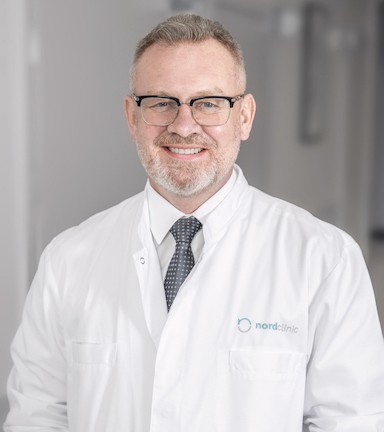
- Our surgeon Nerijus Kaselis is a doctor with a degree in medicine
- Member of the International Federation of Obesity
- Has been practising abdominal surgery for over 32 years, specialising in bariatric surgery for the past 18 years
- Was the first surgeon to perform various laparoscopic surgeries in Lithuania
- Works as a team lead of surgeons in complicated obesity surgeries abroad
- Has international work and study experience
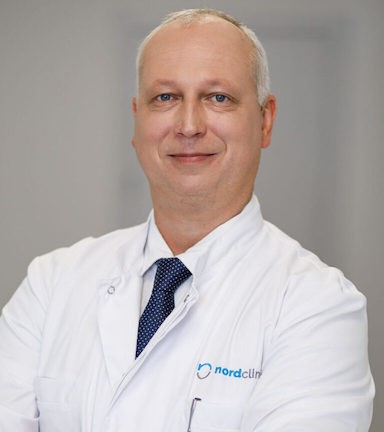
- Our surgeon Linas Venclauskas has over 15 years of experience
- Specialises in minimally invasive surgery, surgical treatment of the upper gastrointestinal tract and bariatric surgery
- Associate Professor at Lithuanian University of Health Sciences
- President of the Kaunas Society of Surgeons
- A member of the European Hernia Society
- Chairman of the Lithuanian Society of Hernia Surgery
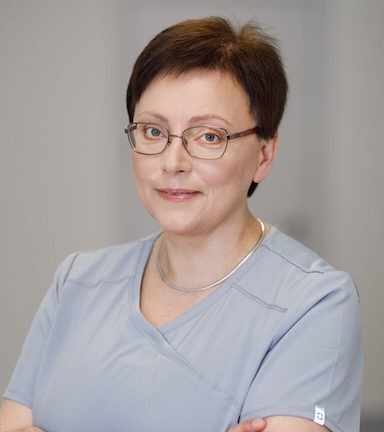
- Our surgeon Aurika Karbonskiene has over 25 years of experience as anesthesiologist
- Over 15 years of experience as a bariatric anesthesiologist
- Since 2008 – Associate Professor at Lithuanian University of Health Sciences
- Board member of Lithuanian Society of Anesthesiologists and Intensive Care Physicians
- Member of the European Society of Anesthesiology
- Researcher and coordinator at the Clinical Trial Network of European Society of Anesthesiology

- Our surgeon Almantas Maleckas is a doctor of medical science
- UK General Medical Council (GMC) certified
- He performed over 7.000 bariatric operations
- A pioneer in laparoscopic surgery in the region
- More than 15 years working experience in Sweden, Gothenburg University hospital
- Works both in Lithuania and Sweden, speaks fluent English and Swedish
- London School of Economics graduate

- Our surgeon Nerijus Kaselis is a doctor with a degree in medicine
- Member of the International Federation of Obesity
- Has been practising abdominal surgery for over 32 years, specialising in bariatric surgery for the past 18 years
- Was the first surgeon to perform various laparoscopic surgeries in Lithuania
- Works as a team lead of surgeons in complicated obesity surgeries abroad
- Has international work and study experience

- Our surgeon Linas Venclauskas has over 15 years of experience
- Specialises in minimally invasive surgery, surgical treatment of the upper gastrointestinal tract and bariatric surgery
- Associate Professor at Lithuanian University of Health Sciences
- President of the Kaunas Society of Surgeons
- A member of the European Hernia Society
- Chairman of the Lithuanian Society of Hernia Surgery

- Our surgeon Aurika Karbonskiene has over 25 years of experience as anesthesiologist
- Over 15 years of experience as a bariatric anesthesiologist
- Since 2008 – Associate Professor at Lithuanian University of Health Sciences
- Board member of Lithuanian Society of Anesthesiologists and Intensive Care Physicians
- Member of the European Society of Anesthesiology
- Researcher and coordinator at the Clinical Trial Network of European Society of Anesthesiology
5-year follow up with dietitian
Nutrition is one of the main focus after weight loss surgery to maximize weight loss and prevent weight gain. We offer a dietitian who will talk with you about the diet you’ll need to follow after surgery, explaining what types of food and how much you can eat at each meal. Karolina is a dietitian and Nutrition Consultant with a degree in the medical field. Read more about her here.
11 reasons that make us the most popular bariatric clinic abroad
Our team of 3 bariatric surgeons has 15-20 years of experience in the field in total performing over 500 different bariatric surgeries per year. Moreover, our surgeons are members of various prestigious surgical societies both Lithuanian and international. Our leading bariatric surgeon Dr Almantas Maleckas has performed more than 7.000 bariatric surgeries. He is fluent in four languages, among which English and Swedish. The surgeon has been regularly working in Sweden for over 15 years. Dr Maleckas is a pioneer of laparoscopic surgery in Eastern Europe and has trained many other bariatric surgeons in the region.
We are one of the leading bariatric surgery clinics for medical tourists in the European Union. We are proud of the fact that over 90 % of our patients come from the UK, Ireland, Norway, Sweden, Denmark, Germany, Switzerland and other countries.
We are trusted by our patients and we appreciate all the reviews and feedback collected over the years. Find testimonials here or on Google.
Already more than 5.000 of our former, current and future patients joined our online community with the aim to build a space for opinions and mutual support. Members are welcome to share experiences about their visit to the clinic and to discuss all surgery-related matters.
We offer a 5-year follow-up which includes being able to get in touch with our Lithuanian dietitian Karolina. She is consulting patients after surgery and is available upon request to answer postoperative nutritional questions for five years after surgery.
Our clinic is the only clinic that has developed its own app designed specifically for bariatric patients – Bariatric IQ. The most useful feature of this app is special bariatric diet recommendations based on a particular product, a patient’s gender, time after surgery and other factors. Such a feature has not been replicated by any other bariatric apps in the world. Read more and download the app on your IOS or Android smartphone here.
Our clinic works according to the highest standards set by the European Union. This helps to guarantee the quality of medical services. We care about the safety, comfort and successful results of our patients from all over the world.
The clinic helps patients with the documents needed to claim a refund after following the EU directive route for medical treatment abroad. It applies to patients who are insured under the systems of one of the EU countries and may not get the surgery due to long waiting times.
We provide customer service in 9 foreign languages including English, Swedish, Norwegian, Danish, Italian, Spanish, French, Russian, Polish. Everyone in our clinic speaks English, including nurses, assistants and the surgeon.
Combining different plastic surgery procedures to offer optimal treatment for post-bariatric patients has been our plastic surgery department’s specialisation for many years now. We have performed such surgeries for more than 10.000 patients to this date. Since weight loss patients often require multiple surgical procedures to address excess skin, surgery planning and surgeons’ experience are very important. We carefully select patients, evaluate each case individually, and only agree to combine surgeries within health & safety limits. Our team of 9 plastic surgeons performs more than 3.000 plastic operations a year, a number that no other clinic in Central & Eastern Europe can match.
Special bariatric app for your mobile phone
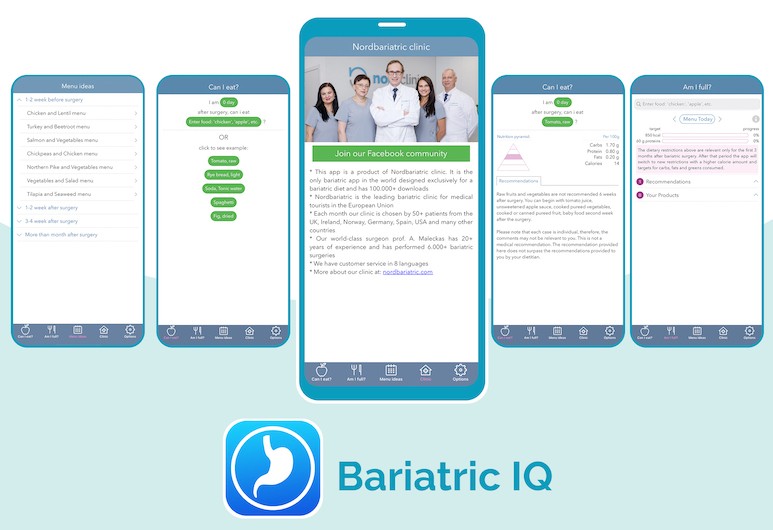
- Created by Nordbariatric clinic
- Special bariatric diet recommendations based on a particular product, a patient’s gender, time after surgery and other factors
- Available in 6 languages
- Available on iOS as well as Android.
- To this date the app was downloaded more than 100.000 times!
- Read more
Our clinic

Self-catered accommodation with medical care
What is banded gastric bypass? How is the surgery performed?
Even though gastric bypass is widely known as the gold standard procedure for quickly treating morbid obesity, insufficient weight loss and even long-term weight regain have been observed in a relatively large number of post-operative patients worldwide. While the cause of inadequate weight loss and weight regain depends on a number of factors, an increase in the gastric reservoir size due to dilatation of the pouch is frequently suggested as one of the main reasons. Either a dilated pouch or a dilated pouch outlet can lead to poor restriction, lack of satiety, and consequently, regain of weight. In order to prevent that, a variation of the gastric bypass surgery was introduced: the banded gastric bypass.
Banded gastric bypass is an advanced gastric bypass characterised by placing a band around a surgically created small (≤30.0 ml) upper gastric pouch. The band enhances restrictive mechanisms, preventing long-term weight regain and eventual revision surgery. Banded gastric bypass is performed laparoscopically through small incisions that are created for the abdominal cavity to be accessed. A single camera port and a couple of operating ports are placed to serve as passageways for specially designed surgical instruments that are used to manipulate the intra abdominal contents. Therefore, the laparoscopic banded gastric bypass surgery is also found to be very safe, with a similar complication rate between banded and nonbanded surgery, and a low incidence of band-related problems.
FAQ sessions with our surgeon
Watch full list of interview sessions on our Youtube channel.
When would one require a banded gastric bypass?
In general, an eligible candidate for a weight-loss surgery is someone with body mass index (BMI) of 35 or higher.
The candidacy of patients with BMI lower than 35 can also be considered if life-threatening comorbidities, such as cardiopulmonary problems or severe diabetes mellitus etc., are present.
However, as with all bariatric procedures, banded gastric bypass should not be the first choice solution when coping with obesity. An ideal candidate for banded gastric bypass should have a history of failed attempts to lose weight conservatively and be willing to make dietary and lifestyle changes in order to maintain sustained weight loss after the procedure.
Nonetheless, banded gastric bypass is especially beneficial to those who are at a higher risk of long-term weight regain due to imbalanced caloric intake. Patients who have difficulties with adhering to a strict nutritional and exercise regimen, or have already unsuccessfully tried to acquire new coping skills to decrease reliance on food for addressing emotional needs should consider choosing banded gastric bypass, as the band mechanically limits the amount of food that may be comfortably eaten.
When gastric bypass is formed and no band is placed around it, the gastric pouch may easily enlarge from constant overeating and revision surgery may become necessary for adequate weight loss to be maintained. However, every surgical intervention is associated with risks of perioperative and postoperative complications that may impair vitally important organ functions and the overall quality of life.
Book a consultation with our surgeon in London
London consultation in:
Don’t miss a chance to book a consultation with our surgeon prof. Almantas Maleckas in London! Read more
Pros and cons of a banded bypass
- Initial and sustained weight loss.
- Resolution or remission of obesity-related comorbidities, such as type II diabetes, cardiovascular diseases, osteoarthritis etc.
- Relatively low perioperative and postoperative complication rate.
- Minimally invasive operative technique
- Low revision rate after initial banded bypass.
- Long-term improvements in physical and emotional health.
- Significant dietary restrictions due to reduced gastric capacity.
- Permanent changes in stomach anatomy.
- Risk of dumping syndrome that includes lightheadedness, fatigue, and diarrhoea that can be caused by consumption of sugary foods, as well as potential vitamin and mineral deficiency.
Preparing for a banded bypass
Even though the preparation process for banded bypass is rather uncomplicated and does not significantly differ from preparing for any other bariatric surgery, there are a few notes that should be taken into account for recovery and the long-term weight-loss outcome to be as successful as possible. To assess one’s motivation and predict the adherence to postsurgical recommendations, patients are encouraged to lose some weight before the surgery. However, if a patient is unable to make significant changes in their diet or increase the level of physical activity before the surgery, it may still be performed.
There are a few general pre-surgery recommendations that should be followed in order to properly prepare for any surgical intervention:
Avoid using tobacco products and consuming alcohol before the procedure for as long as possible. Alcohol and chemical compounds inhaled with smoke may seriously compromise the healing process and delay recovery.
In order to prevent perioperative complications the use of aspirin, anti-inflammatory drugs and other blood thinners should be avoided before the procedure, unless the operating doctor has advised otherwise.
Consult the surgeon about your allergies, previous surgeries and daily medications. If you have any pre-existing conditions that require daily usage of medication, your operating doctor should be informed about it.
Recovery after banded bypass
Banded gastric bypass is a minimally invasive procedure, widely acclaimed for its relatively short recovery time. Even though it takes up to 3-5 weeks to fully recover after the surgery, post-surgery patients may leave the hospital one day after the procedure and resume their daily activities in 3-5 days.
In the first few days after the procedure it is not unusual to feel mild to moderate discomfort when eating. This is because your whole body has to adapt to significantly altered gastric anatomy and optimise the digestive process. In the first several months after weight loss surgery patients are encouraged to gradually incorporate new products into their diet and strictly avoid overeating, as it may provoke dumping syndrome, vomiting and other unpleasant symptoms.
In the first weeks after the surgery patients are encouraged to start exercising regularly.
Patients are strongly discouraged from consuming alcohol and using tobacco products, especially while taking any kind of prescribed medication after the surgery, for they may provoke some toxic side effects and complications could develop.
Life with banded bypass and lifestyle changes needed
As with all bariatric procedures, lifestyle changes after banded bypass are inevitable in order to achieve and maintain long-term results.
- As gastric volume is surgically reduced, less food can be comfortably eaten at a time. Portion control will help the stomach to avoid regaining its preoperative state and limits caloric intake.
- Physical activity plays an essential role in weight loss maintenance after bariatric surgery.
- Daily usage of vitamins and food supplements are advised in order to prevent nutrient deficiencies.
- Massive weight-loss in a short period of time may result in progressive loss of skin elasticity. In this case another body contouring surgery should be considered.
Will my band ever need to be removed?
Gastric band is supposed to stay inside one’s body permanently. However, a relatively low incidence of displacement and erosion of the band has been observed worldwide. When a band is displaced or causes disruption in the stomach wall, it must be removed to avoid further complications.
Send us your enquiry






